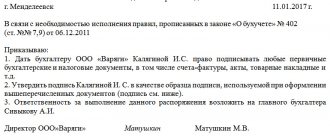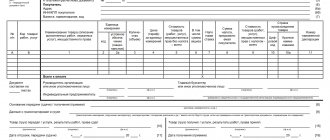Any primary document reflects any fact of the economic life of the organization and confirms either income or expenses. This means that primary documents directly influence the formation of the organization’s final financial performance indicators and the tax base when calculating taxes. Due to incorrectly executed primary accounting documents, a company can distort the financial indicators of the final accounting and tax reporting.
It is for this reason that it is necessary to be attentive to primary documents and competently organize document flow in the organization. It is also required that the document forms used in the organization be secured by the accounting policy, and new forms must be approved by order of the manager. Let's look at the main errors in working with primary documents that need to be found on time and corrected.
Error 3. Primary documents are drawn up in violation of the provisions of the contract
Any business entity, in order to reduce the taxable base for VAT and profit, has the right to use a universal transfer document (UTD) (letter of the Federal Tax Service of Russia dated October 21, 2013 No. ММВ-20-3 / [email protected] “On the absence of tax risks when taxpayers use a primary document, based on the invoice").
In addition, the UPD form is advisory in nature and based on the letter of the Federal Tax Service of Russia dated September 14, 2017 No. ED-4-15/18322, it can be supplemented. However, some counterparties have so far refused to work with UTD and provide separate provisions for an invoice and a document in their contracts.
According to Article 309 of the Civil Code of the Russian Federation, contractual obligations must be fulfilled in accordance with the terms of the concluded agreement. This is especially true for relationships with government customers.
Recommendations: make sure that the primary documents are drawn up in accordance with the requirements of the provisions of the concluded agreements in order to avoid controversial situations with the counterparty.
Error 4. According to TORG-12 or the act, transportation costs cannot be accepted
Often in practice, when receiving goods under concluded supply contracts, transportation costs are highlighted as a separate line. Based on clauses 1-3 of Art. 8 of the Charter of Motor Transport, approved by 259-FZ of November 8, 2007, the transportation of cargo is confirmed by such a primary document as a bill of lading. Cargo without a waybill will not be accepted for transportation. The form of the consignment note is contained in Appendix No. 4 to the Rules for the transportation of goods by road, approved by Decree of the Government of the Russian Federation of April 15, 2011 No. 272.
Recommendations: make sure that in the package of primary documents for the supply of goods, when highlighting transport costs in them, there must be a transport invoice as a separate line. In its absence, transport costs are not accepted to reduce the tax base for profit and VAT.
Poor quality document from a partner
Here's another example. It shows that if you received an unfinished document from your partner, this does not mean that penalties can be imposed on your company.
Example
The tax inspectorate conducted an on-site audit, as a result of which it was decided to hold the company accountable.
The basis for this decision was, in particular, the lack of invoices in the 1-T form.
However, the court did not agree with the point of view of the tax authorities, pointing out that the fact that the company posted the purchased goods was confirmed by invoices in the TORG-12 form. In response to this, the tax inspectorate gave another argument: in the invoices (TORG-12) there is no reference to the number and date of the invoice.
But the arbitrators did not agree with this argument either, emphasizing that “the absence of a reference to the number and date of the waybill, upon actual acceptance of the goods for registration, confirmation by witnesses of the fact of delivery of the goods by the supplier, does not indicate the absence of delivery of the goods” (resolution of the Federal Antimonopoly Service of the West Siberian District dated September 22, 2010 in case No. A27-391/2010 (by decision of the Supreme Arbitration Court of the Russian Federation dated January 21, 2011 No. VAS-67/11, the case was refused to be transferred to the Presidium of the Supreme Arbitration Court of the Russian Federation for review in the order of supervision)).
Error 6. The work of special equipment at the site is not documented in primary documents
Often, when carrying out construction work, the necessary construction equipment and crew are rented.
According to paragraph 1 of Art. 609, a lease agreement in which one of the parties is a legal entity is concluded in writing, regardless of the term and subject of the lease. If one of the parties to the lease agreement is an individual entrepreneur who applies a simplified taxation system, then he may not keep accounting records and in this case problems arise with the primary documents. What to do in such a situation?
Considering that the agreement is concluded in writing, then in the agreement you can provide in separate provisions the package of primary documents necessary to confirm the organization’s expenses.
As a rule, for this type of expense, this is an act of provision of services and copies of waybills (standard interindustry form ESM-2) or copies of reports on the operation of special equipment (standard interindustry form ESM-3). But the service provider may use other forms of primary documents.
If you use a common taxation system, then to optimize your tax base it is better to involve counterparties who provide services with a taxation system similar to yours.
Recommendations: make sure that in the package of documents when forming an agreement with the counterparty with whom the agreement for the rental of special equipment with a crew is concluded, the special equipment provided for in the agreement and the necessary specialists for this work are available, and this is confirmed by documents.
To justify your good faith in accordance with Art. 54.1 of the Tax Code of the Russian Federation, request copies of the PTS and staffing table. If the contractor-supplier does not have the necessary specialist on staff and does not own or lease special equipment, your risks of not accepting expenses to reduce the tax base for profits and VAT increase (basic clause 1 of Article 252 of the Tax Code of the Russian Federation).
Primary documents: consequences of absence
The greatest discussions, as a rule, are caused by questions of civil law consequences of the absence of primary accounting documents. What are the consequences in the civil law sphere of an organization’s lack of or failure to provide a primary accounting document to a counterparty?
Clause 1 Art. 9 of the Federal Law of December 6, 2011 No. 402-FZ “On Accounting” determines that each fact of economic life is subject to registration as a primary accounting document. The same norm states: “it is not allowed to accept for accounting documents documents that document facts of economic life that have not taken place, including those underlying imaginary and feigned transactions.”
In this case, a fact of economic life should be understood as a transaction, event, operation that has or is capable of influencing the financial position of an economic entity, the financial result of its activities and (or) cash flow.
Art. 9 of the Federal Law of December 6, 2011 No. 402-FZ “On Accounting”, called “Primary Accounting Documents” and entirely devoted to this issue, also defines the mandatory details of the primary accounting document, the time of its preparation, as well as the procedure for determining its form.
The consequences of the lack of necessary primary accounting documents lead to the possibility of the following consequences:
- civil law;
- administrative;
- tax.
In this case, it would also be appropriate to talk about possible disciplinary (at the discretion of the business entity) and criminal liability of employees of the business entity.
Let's take a closer look at the civil consequences.
1. Failure to provide the counterparty with the primary accounting document may result in the application of a fine if such a condition is agreed upon in the contract/agreement concluded between the parties. Nowadays, it is a very common practice to include conditions in the contract, according to which failure to provide/late provision of primary accounting documents entails the application of a fine to the violator.
2. If, as a result of your failure to provide primary accounting documents, the counterparty suffers losses, these losses may be assigned to you. The conditions for the recovery of damages in this case will be several factors, one of which is a correctly drawn up contract including, in particular, relevant representations about the circumstances.
3. The absence of a primary accounting document confirming your relationship with the counterparty will make it difficult, and in many cases with a high degree of probability, will not allow you to collect from him the debt arising as a result of such relationships.
In certain cases (when collecting debt under contract-type agreements, for example), other evidence may come to the rescue (for example, conducting an examination to determine the fact and quality of work performed). In other relationships, it often becomes impossible to confirm the occurrence of a debt (for example, under a contract for the supply of individually uncertain items).
Free e-book “Automation of document flow from A to Z”
Judicial practice is developing in such a way that the courts point out the need for participants in civil transactions to document the facts of their economic life and refuse to satisfy demands for debt collection on the basis of indirect evidence (for example, the Resolution of the Arbitration Court of the North Caucasus District in case No. A53-3848/2017 dated 01/19/2018).
4. Your lack of primary documents (contradiction with other documents) may lead to doubt about the reality of the relevant relationship (delivery made, services provided, etc.), recognition of the relevant transaction as imaginary or feigned (for example, Resolution of the Third Arbitration Court of Appeal dated September 26. 2018 in case No. A33-9990/2017, Resolution of the Arbitration Court of the Ural District dated September 19, 2017 No. F09-4868/17 in case No. A60-44638/2015). This, in turn, can lead to extremely negative tax consequences.
Separately, I would like to dwell on the possible consequences of the lack of the “correct reaction” to the documents provided by the counterparty, namely a reasoned refusal to sign, for example, a certificate of work performed or a certificate of services rendered. It is now quite popular to include in contracts (this is especially true for contract-type contracts) a condition that failure to provide a reasoned refusal to accept work/provide services within a certain period of time from the date of submission of the certificate means that the work has been completed (option: services have been provided) , and the act is considered signed. We, of course, recommend including such wording in the contract if you are the contractor, but we do not recommend it if you are the customer.
However, regardless of your role in the contract, you should always take into account in your work that such wording really “works”, and the courts will recognize the absence of a reasoned refusal as evidence that the work has been completed (services have been provided) in the absence of compelling evidence to the contrary. Even just the presence in the contract of a period for providing a reasoned refusal of the act in the absence of further decoding on the recognition of the act as signed will most likely entail similar consequences.
Error 7. Making changes to financial statements
From January 1, 2021, a legal copy of financial statements will be submitted electronically via TKS to the tax authority for placement in a special resource GIR BO (state information resource for financial statements), for which the Federal Tax Service will be responsible (such changes to the accounting law were introduced by the Federal Law of November 28, 2018 No. 444-FZ).
In case of correction of an error in the already submitted financial statements, the corrected financial statements are submitted to the Federal Tax Service in the form of an electronic document according to the TKS no later than 10 working days from the day following the day the correction was made, or after the day of approval of the annual accounting statements, if federal laws or the constituent documents of the company provide for the approval of financial statements.
Recommendations: do not forget, when making changes to the financial statements, to promptly submit its updated data to the Federal Tax Service. Responsibility for violation of accounting rules is provided for in Article 120 of the Tax Code of the Russian Federation and Article 15.6 of the Code of Administrative Offenses of the Russian Federation in the form of monetary fines.
Not all details are filled in
As arbitration practice shows, in such cases the courts often take the side of taxpayers.
Example
The LLC transferred funds to the foreign partner to pay for consulting services.
However, the act confirming the provision of services did not contain all the necessary details. During the on-site inspection, tax inspectors regarded this as a violation of the Federal Law “On Accounting” and excluded the amount paid to the foreign partner from the cost price.
As a result, it was decided to assess additional tax, as well as to collect penalties and fines from the enterprise.
The enterprise did not agree with the inspection's decision and appealed to the arbitration court.
Having studied the case materials, the court sided with the enterprise. He, in particular, pointed out that “minor deficiencies in the preparation of primary documents ... do not indicate the absence of a business transaction, as well as the absence of expenses for the company to pay for consulting services.”
Due to the abolition of the mandatory use of unified forms of primary documents, companies should reduce the number of disputes with inspectors. Controllers will no longer be able to “remove” expenses due to improperly executed documents, since the requirement to use standard forms of documents does not exist from January 1, 2013 (Article 9 of the Federal Law of December 6, 2011 No. 402-FZ).









